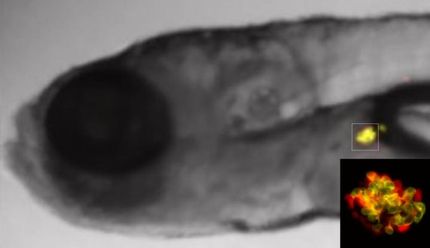Study reveals protein to target in type 2 diabetes
When the body’s cells don’t respond normally to insulin — a condition known as insulin resistance — blood glucose levels can increase, resulting in type 2 diabetes. Researchers have long known that insulin resistance is linked to defects in the insulin receptor (which controls glucose uptake) in multiple organs, including the liver.
To study the underlying mechanism, a team of researchers led by Narendra Wajapeyee, assistant professor of pathology, and Gerald Shulman, professor of cellular and molecular physiology and internal medicine, used a genomic technique to screen more than 600 proteins. They found that one of the proteins, MARCH1, impairs insulin by promoting the breakdown of the insulin receptor on the cell surface. MARCH1, which is increased in obese individuals, could be a promising new target for drugs to treat type 2 diabetes, they said. Lead authors on the study were Arvind Nagarajan and Max Petersen.
Original publication
Arvindhan Nagarajan, Max C. Petersen, Ali R. Nasiri, Gina Butrico, Annie Fung, Hai-Bin Ruan, Romy Kursawe, Sonia Caprio, Jacques Thibodeau, Marie-Claude Bourgeois-Daigneault, Lisha Sun, Guangping Gao, Sanjay Bhanot, Michael J. Jurczak, Michael R. Green, Gerald I. Shulman & Narendra Wajapeyee; "MARCH1 regulates insulin sensitivity by controlling cell surface insulin receptor levels"; Nature Comm.; 2016
Most read news
Original publication
Arvindhan Nagarajan, Max C. Petersen, Ali R. Nasiri, Gina Butrico, Annie Fung, Hai-Bin Ruan, Romy Kursawe, Sonia Caprio, Jacques Thibodeau, Marie-Claude Bourgeois-Daigneault, Lisha Sun, Guangping Gao, Sanjay Bhanot, Michael J. Jurczak, Michael R. Green, Gerald I. Shulman & Narendra Wajapeyee; "MARCH1 regulates insulin sensitivity by controlling cell surface insulin receptor levels"; Nature Comm.; 2016
Topics
Organizations
Other news from the department science

Get the life science industry in your inbox
By submitting this form you agree that LUMITOS AG will send you the newsletter(s) selected above by email. Your data will not be passed on to third parties. Your data will be stored and processed in accordance with our data protection regulations. LUMITOS may contact you by email for the purpose of advertising or market and opinion surveys. You can revoke your consent at any time without giving reasons to LUMITOS AG, Ernst-Augustin-Str. 2, 12489 Berlin, Germany or by e-mail at revoke@lumitos.com with effect for the future. In addition, each email contains a link to unsubscribe from the corresponding newsletter.




















































